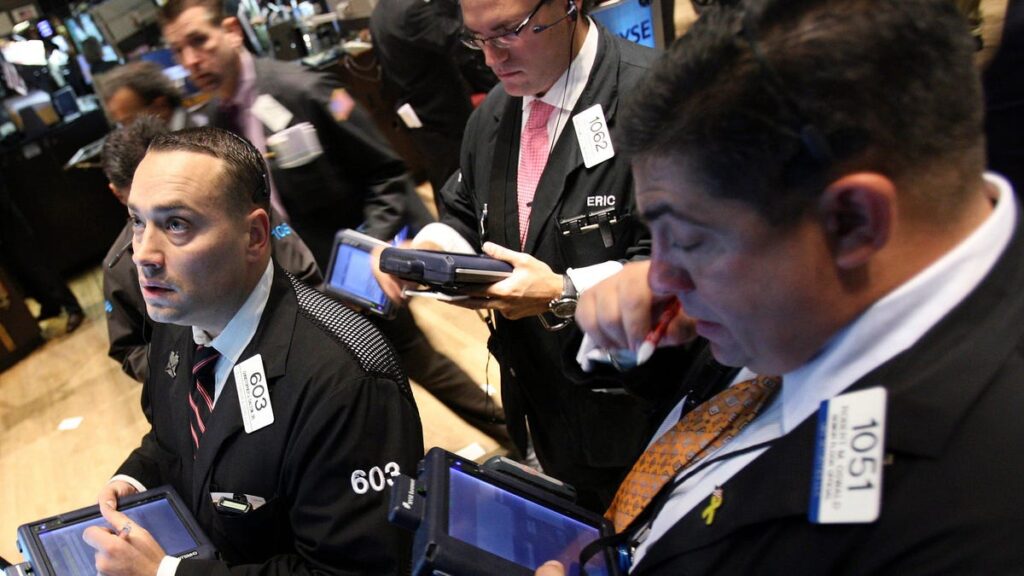US stock markets continue to plunge after Trump’s tariff rollout
US stock futures dropped sharply extending a massive two-day sell-off that erased over $5.4 trillion in market value. The S&P 500 is approaching bear market territory, while the Dow fell 1,250 points in futures trading. The Nasdaq dropped 4.6%, and Asian markets followed suit.
unbranded – Newsworthy
President Donald Trump’s historic tariffs have left a trail of troubling recession signals, including tumbling consumer confidence, rising business uncertainty, and a flurry of layoff announcements.
A potentially more worrisome threat emerged Monday – a bear market.
The S&P 500 index briefly entered bear market territory in mid-morning trading – defined as a drop of at least 20% from its recent market peak – before rebounding to close at 5,062, or 17.6% off its February 19 high.
Officially, then, the benchmark index is not in a bear market but stocks are highly volatile and could slip into that dreaded zone any day.
Does a bear market mean recession?
That would be noteworthy because nine of the past 14 bear markets since World War II have been followed by recessions within an average of six months, according to analyses by CFRA Research, an investment research firm, and Moody’s Analytics, an economic research company.
All four of the most recent U.S. downturns have been foreshadowed by market bears: the early 1990s slump triggered by the Federal Reserve’s high interest rates, an oil price shock and savings and loan crisis; the dotcom bust of the early 2000s; the housing crisis that sparked the Great Recession of 2007-09; and the pandemic recession of 2020, though that downturn and bear market were virtually concurrent.
By contrast, the Oct. 19,1987 market plunge known as Black Monday – caused by overvalued stocks and computerized trading – was not followed by a recession. Neither was the 2022 bear set off by the Fed’s hefty interest rate hikes to fight a pandemic-induced inflation surge.
“The stock market selloff is both a signal of a future recession but also a potential cause,” said Mark Zandi, chief economist of Moody’s Analytics.
In other words, if investors are unloading stocks, that’s a sign they’ve lost faith in the economy and thus corporate earnings. And since investors are often right, it could be a clue that the economy is headed south.
Fundamentally, the tariffs could cause a recession by sharply raising prices on imported goods and leading consumers to scale back spending, which makes up 70% of economic activity. JPMorgan Chase has raised its recession odds to 60% while other economic firms have boosted the chances to nearly 50%.
How does wealth influence consumer spending?
At the same time, higher-income Americans have much of their savings in the stock market and so a big drop in equities prices typically prompts them to reduce their outlays.
The chances of such negative “wealth effects” triggering a downturn are higher these days because the top 10% of households by income, who are most likely to own stocks, now account for half of all consumer spending, up from about a third in the early 1980s, Zandi said.
Also, more people at all income levels own stocks through 401(k) plans, said Sam Stovall, chief investment strategist of CFRA. About 60% of middle-aged households own stocks directly or indirectly through 401(k) plans or mutual funds, up from 40% in 1989, according to a report by the Federal Reserve Bank of St. Louis.
Ryan Detrick, chief market strategist at Carson Group, figures the nation will dodge a recession as households, bolstered by solid wage growth and low debt levels, continue to spend and support corporate profits despite higher prices.
“We remain optimistic that consumer balance sheets and corporate earnings will remain strong the next few quarters,” he said,
One factor distinguishing the current market selloff from previous ones is that it’s been almost entirely driven by Trump’s actions, Zandi said, rather than a cocktail of economic forces. Thus, the duration of any bear market and the question of whether it will lead to recession are highly uncertain, he said.
“He could change his mind in the next two seconds and drop the tariffs,” Zandi said, turbocharging the market and easing recession fears.
Is the 2025 recession coming?
Zandi believes the nation ultimately will sidestep a downturn because Trump administration officials will grant countries enough exemptions and carve-outs or negotiate down the tariffs to keep the economy afloat – barely. He figures the economy will grow a meager 0.7% in 2025 and job growth will come to a standstill by year’s end.
In that sense, the current episode is reminiscent of the bear market of December 1961- June 1962, Stovall said. That crash was also caused by a president’s words or actions – John F. Kennedy’s browbeating of the nation’s largest steelmakers to roll back recently announced price increases, raising concerns about government meddling in the private market.
That market selloff was not followed by a recession.
